Fostering Dignity and Respect in Healthcare
VerifiedAdded on 2023/01/13
|9
|2705
|62
AI Summary
This study explores the importance of fostering dignity and respect in healthcare, focusing on effective communication and interpersonal skills. It discusses the ethical and moral concepts related to freedom and the use of power in care, and provides strategies to enhance dignity. The study also reflects on personally held values and their impact on individual learning and development.
Contribute Materials
Your contribution can guide someone’s learning journey. Share your
documents today.
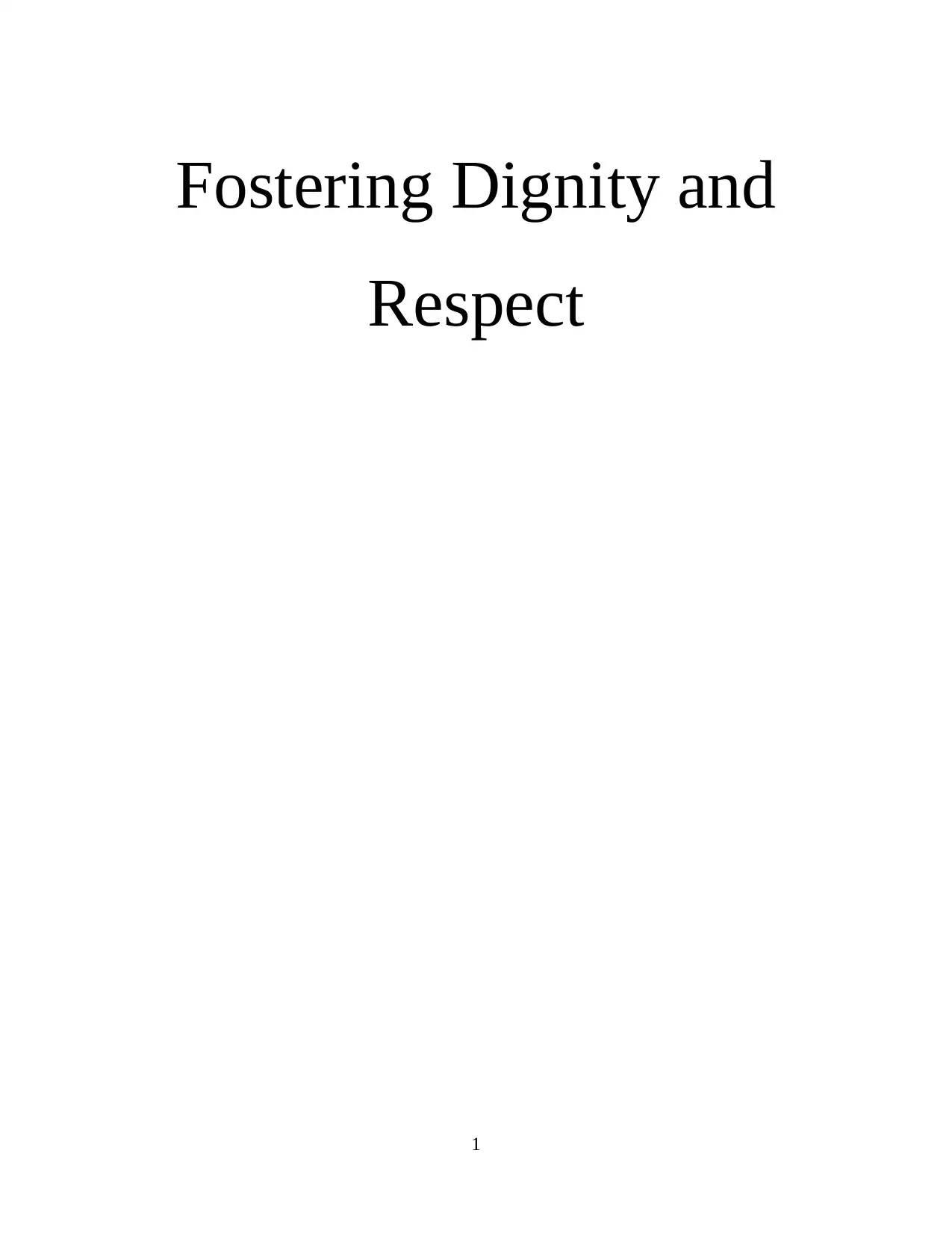
Fostering Dignity and
Respect
1
Respect
1
Secure Best Marks with AI Grader
Need help grading? Try our AI Grader for instant feedback on your assignments.
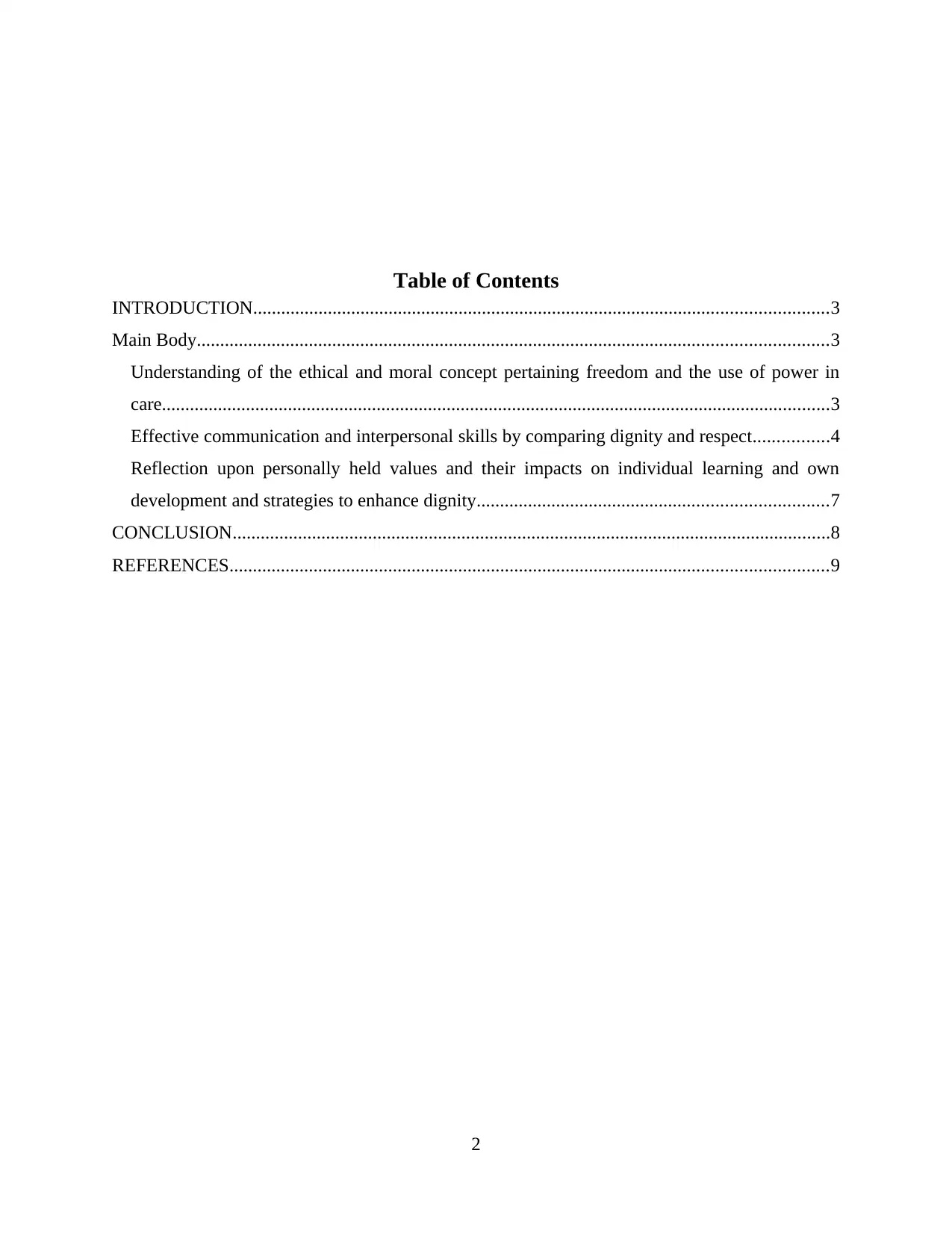
Table of Contents
INTRODUCTION...........................................................................................................................3
Main Body.......................................................................................................................................3
Understanding of the ethical and moral concept pertaining freedom and the use of power in
care...............................................................................................................................................3
Effective communication and interpersonal skills by comparing dignity and respect................4
Reflection upon personally held values and their impacts on individual learning and own
development and strategies to enhance dignity...........................................................................7
CONCLUSION................................................................................................................................8
REFERENCES................................................................................................................................9
2
INTRODUCTION...........................................................................................................................3
Main Body.......................................................................................................................................3
Understanding of the ethical and moral concept pertaining freedom and the use of power in
care...............................................................................................................................................3
Effective communication and interpersonal skills by comparing dignity and respect................4
Reflection upon personally held values and their impacts on individual learning and own
development and strategies to enhance dignity...........................................................................7
CONCLUSION................................................................................................................................8
REFERENCES................................................................................................................................9
2
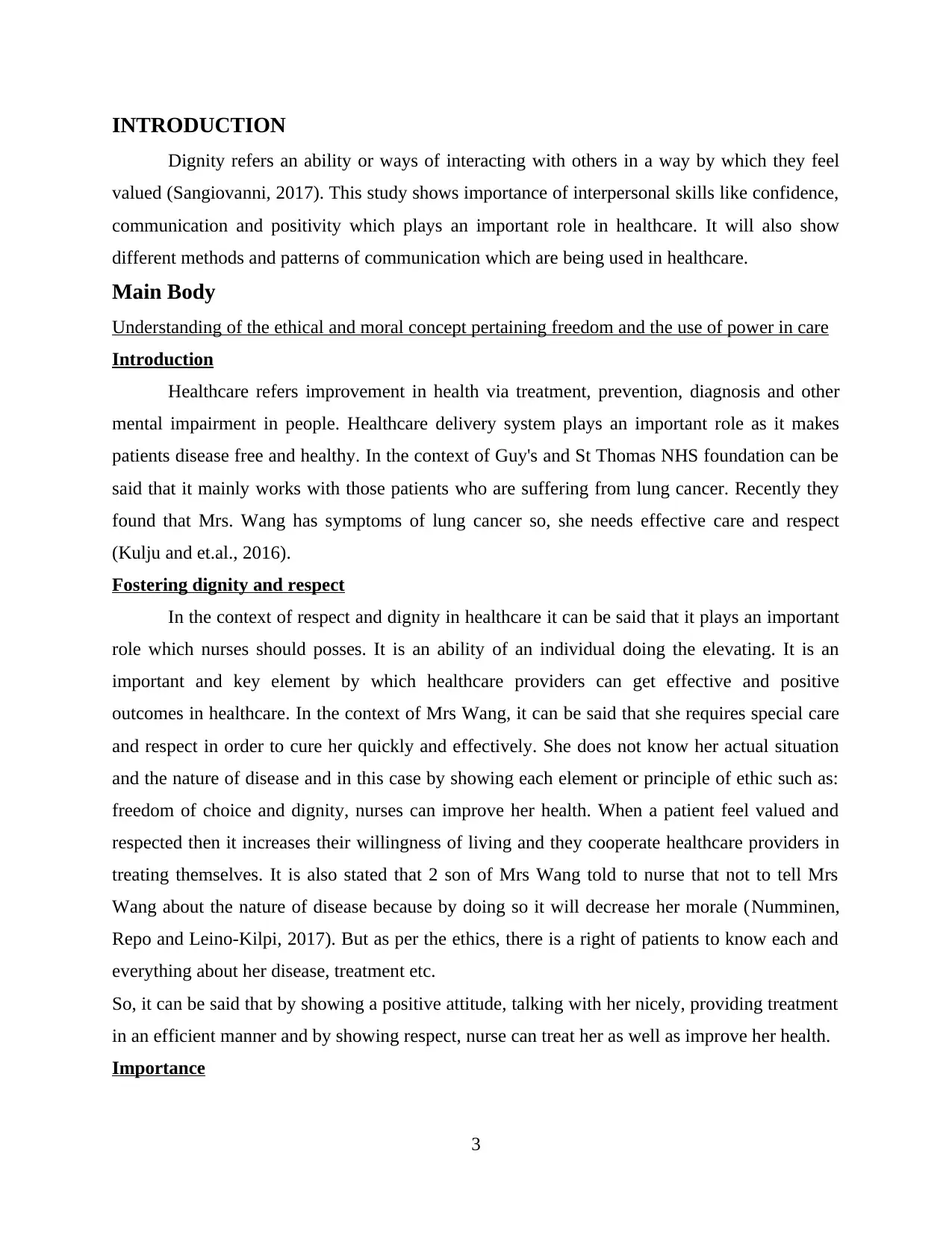
INTRODUCTION
Dignity refers an ability or ways of interacting with others in a way by which they feel
valued (Sangiovanni, 2017). This study shows importance of interpersonal skills like confidence,
communication and positivity which plays an important role in healthcare. It will also show
different methods and patterns of communication which are being used in healthcare.
Main Body
Understanding of the ethical and moral concept pertaining freedom and the use of power in care
Introduction
Healthcare refers improvement in health via treatment, prevention, diagnosis and other
mental impairment in people. Healthcare delivery system plays an important role as it makes
patients disease free and healthy. In the context of Guy's and St Thomas NHS foundation can be
said that it mainly works with those patients who are suffering from lung cancer. Recently they
found that Mrs. Wang has symptoms of lung cancer so, she needs effective care and respect
(Kulju and et.al., 2016).
Fostering dignity and respect
In the context of respect and dignity in healthcare it can be said that it plays an important
role which nurses should posses. It is an ability of an individual doing the elevating. It is an
important and key element by which healthcare providers can get effective and positive
outcomes in healthcare. In the context of Mrs Wang, it can be said that she requires special care
and respect in order to cure her quickly and effectively. She does not know her actual situation
and the nature of disease and in this case by showing each element or principle of ethic such as:
freedom of choice and dignity, nurses can improve her health. When a patient feel valued and
respected then it increases their willingness of living and they cooperate healthcare providers in
treating themselves. It is also stated that 2 son of Mrs Wang told to nurse that not to tell Mrs
Wang about the nature of disease because by doing so it will decrease her morale (Numminen,
Repo and Leino-Kilpi, 2017). But as per the ethics, there is a right of patients to know each and
everything about her disease, treatment etc.
So, it can be said that by showing a positive attitude, talking with her nicely, providing treatment
in an efficient manner and by showing respect, nurse can treat her as well as improve her health.
Importance
3
Dignity refers an ability or ways of interacting with others in a way by which they feel
valued (Sangiovanni, 2017). This study shows importance of interpersonal skills like confidence,
communication and positivity which plays an important role in healthcare. It will also show
different methods and patterns of communication which are being used in healthcare.
Main Body
Understanding of the ethical and moral concept pertaining freedom and the use of power in care
Introduction
Healthcare refers improvement in health via treatment, prevention, diagnosis and other
mental impairment in people. Healthcare delivery system plays an important role as it makes
patients disease free and healthy. In the context of Guy's and St Thomas NHS foundation can be
said that it mainly works with those patients who are suffering from lung cancer. Recently they
found that Mrs. Wang has symptoms of lung cancer so, she needs effective care and respect
(Kulju and et.al., 2016).
Fostering dignity and respect
In the context of respect and dignity in healthcare it can be said that it plays an important
role which nurses should posses. It is an ability of an individual doing the elevating. It is an
important and key element by which healthcare providers can get effective and positive
outcomes in healthcare. In the context of Mrs Wang, it can be said that she requires special care
and respect in order to cure her quickly and effectively. She does not know her actual situation
and the nature of disease and in this case by showing each element or principle of ethic such as:
freedom of choice and dignity, nurses can improve her health. When a patient feel valued and
respected then it increases their willingness of living and they cooperate healthcare providers in
treating themselves. It is also stated that 2 son of Mrs Wang told to nurse that not to tell Mrs
Wang about the nature of disease because by doing so it will decrease her morale (Numminen,
Repo and Leino-Kilpi, 2017). But as per the ethics, there is a right of patients to know each and
everything about her disease, treatment etc.
So, it can be said that by showing a positive attitude, talking with her nicely, providing treatment
in an efficient manner and by showing respect, nurse can treat her as well as improve her health.
Importance
3
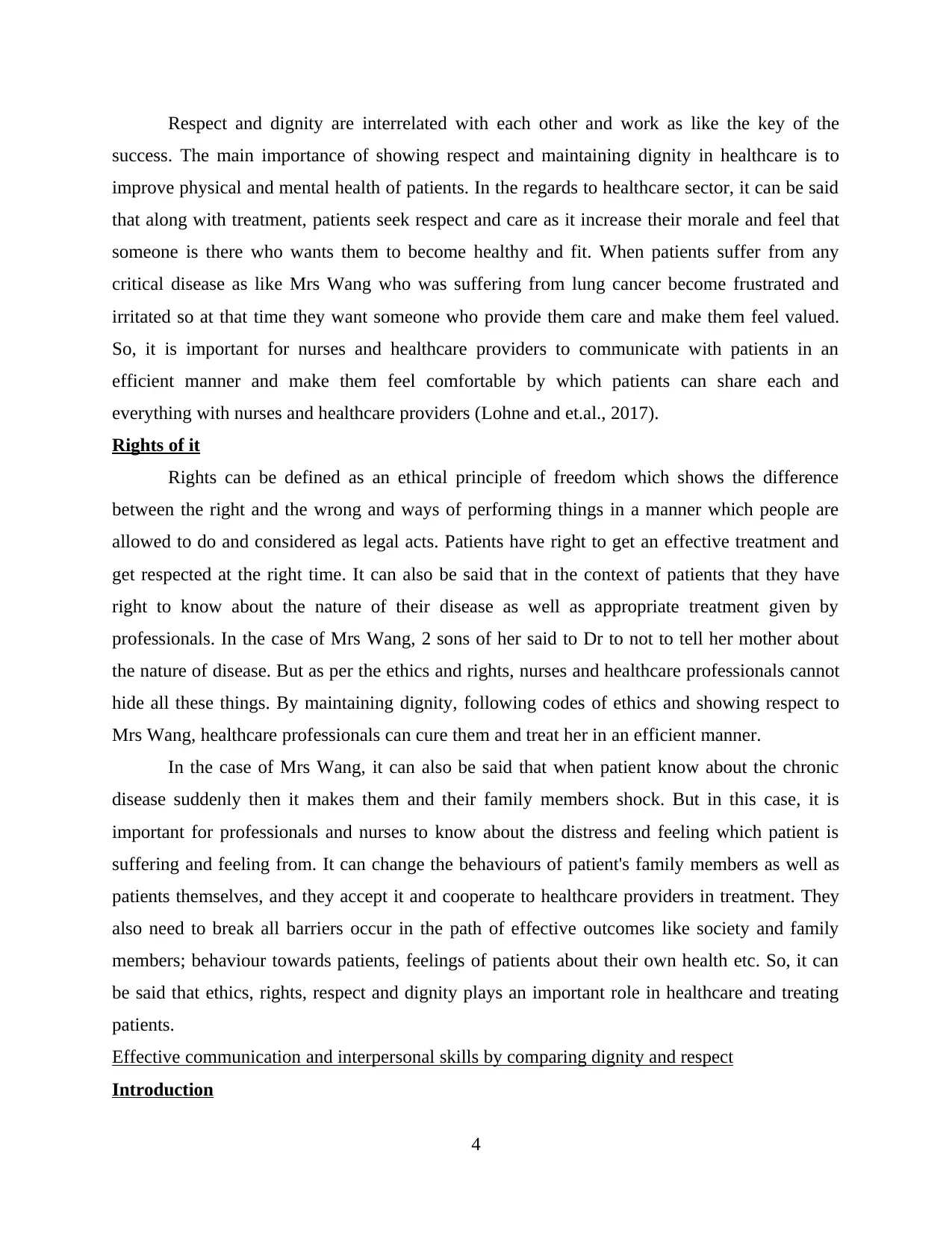
Respect and dignity are interrelated with each other and work as like the key of the
success. The main importance of showing respect and maintaining dignity in healthcare is to
improve physical and mental health of patients. In the regards to healthcare sector, it can be said
that along with treatment, patients seek respect and care as it increase their morale and feel that
someone is there who wants them to become healthy and fit. When patients suffer from any
critical disease as like Mrs Wang who was suffering from lung cancer become frustrated and
irritated so at that time they want someone who provide them care and make them feel valued.
So, it is important for nurses and healthcare providers to communicate with patients in an
efficient manner and make them feel comfortable by which patients can share each and
everything with nurses and healthcare providers (Lohne and et.al., 2017).
Rights of it
Rights can be defined as an ethical principle of freedom which shows the difference
between the right and the wrong and ways of performing things in a manner which people are
allowed to do and considered as legal acts. Patients have right to get an effective treatment and
get respected at the right time. It can also be said that in the context of patients that they have
right to know about the nature of their disease as well as appropriate treatment given by
professionals. In the case of Mrs Wang, 2 sons of her said to Dr to not to tell her mother about
the nature of disease. But as per the ethics and rights, nurses and healthcare professionals cannot
hide all these things. By maintaining dignity, following codes of ethics and showing respect to
Mrs Wang, healthcare professionals can cure them and treat her in an efficient manner.
In the case of Mrs Wang, it can also be said that when patient know about the chronic
disease suddenly then it makes them and their family members shock. But in this case, it is
important for professionals and nurses to know about the distress and feeling which patient is
suffering and feeling from. It can change the behaviours of patient's family members as well as
patients themselves, and they accept it and cooperate to healthcare providers in treatment. They
also need to break all barriers occur in the path of effective outcomes like society and family
members; behaviour towards patients, feelings of patients about their own health etc. So, it can
be said that ethics, rights, respect and dignity plays an important role in healthcare and treating
patients.
Effective communication and interpersonal skills by comparing dignity and respect
Introduction
4
success. The main importance of showing respect and maintaining dignity in healthcare is to
improve physical and mental health of patients. In the regards to healthcare sector, it can be said
that along with treatment, patients seek respect and care as it increase their morale and feel that
someone is there who wants them to become healthy and fit. When patients suffer from any
critical disease as like Mrs Wang who was suffering from lung cancer become frustrated and
irritated so at that time they want someone who provide them care and make them feel valued.
So, it is important for nurses and healthcare providers to communicate with patients in an
efficient manner and make them feel comfortable by which patients can share each and
everything with nurses and healthcare providers (Lohne and et.al., 2017).
Rights of it
Rights can be defined as an ethical principle of freedom which shows the difference
between the right and the wrong and ways of performing things in a manner which people are
allowed to do and considered as legal acts. Patients have right to get an effective treatment and
get respected at the right time. It can also be said that in the context of patients that they have
right to know about the nature of their disease as well as appropriate treatment given by
professionals. In the case of Mrs Wang, 2 sons of her said to Dr to not to tell her mother about
the nature of disease. But as per the ethics and rights, nurses and healthcare professionals cannot
hide all these things. By maintaining dignity, following codes of ethics and showing respect to
Mrs Wang, healthcare professionals can cure them and treat her in an efficient manner.
In the case of Mrs Wang, it can also be said that when patient know about the chronic
disease suddenly then it makes them and their family members shock. But in this case, it is
important for professionals and nurses to know about the distress and feeling which patient is
suffering and feeling from. It can change the behaviours of patient's family members as well as
patients themselves, and they accept it and cooperate to healthcare providers in treatment. They
also need to break all barriers occur in the path of effective outcomes like society and family
members; behaviour towards patients, feelings of patients about their own health etc. So, it can
be said that ethics, rights, respect and dignity plays an important role in healthcare and treating
patients.
Effective communication and interpersonal skills by comparing dignity and respect
Introduction
4
Secure Best Marks with AI Grader
Need help grading? Try our AI Grader for instant feedback on your assignments.
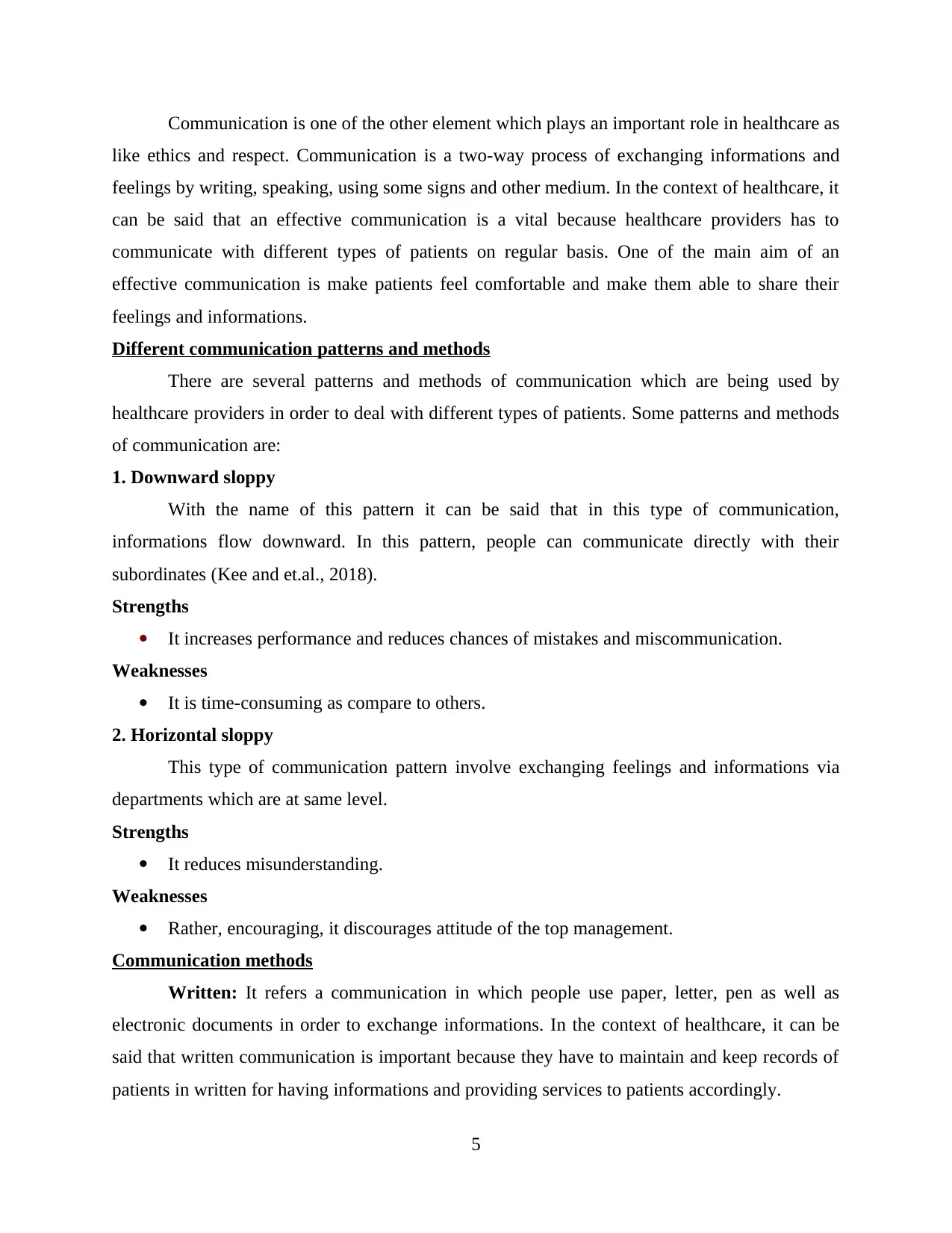
Communication is one of the other element which plays an important role in healthcare as
like ethics and respect. Communication is a two-way process of exchanging informations and
feelings by writing, speaking, using some signs and other medium. In the context of healthcare, it
can be said that an effective communication is a vital because healthcare providers has to
communicate with different types of patients on regular basis. One of the main aim of an
effective communication is make patients feel comfortable and make them able to share their
feelings and informations.
Different communication patterns and methods
There are several patterns and methods of communication which are being used by
healthcare providers in order to deal with different types of patients. Some patterns and methods
of communication are:
1. Downward sloppy
With the name of this pattern it can be said that in this type of communication,
informations flow downward. In this pattern, people can communicate directly with their
subordinates (Kee and et.al., 2018).
Strengths
It increases performance and reduces chances of mistakes and miscommunication.
Weaknesses
It is time-consuming as compare to others.
2. Horizontal sloppy
This type of communication pattern involve exchanging feelings and informations via
departments which are at same level.
Strengths
It reduces misunderstanding.
Weaknesses
Rather, encouraging, it discourages attitude of the top management.
Communication methods
Written: It refers a communication in which people use paper, letter, pen as well as
electronic documents in order to exchange informations. In the context of healthcare, it can be
said that written communication is important because they have to maintain and keep records of
patients in written for having informations and providing services to patients accordingly.
5
like ethics and respect. Communication is a two-way process of exchanging informations and
feelings by writing, speaking, using some signs and other medium. In the context of healthcare, it
can be said that an effective communication is a vital because healthcare providers has to
communicate with different types of patients on regular basis. One of the main aim of an
effective communication is make patients feel comfortable and make them able to share their
feelings and informations.
Different communication patterns and methods
There are several patterns and methods of communication which are being used by
healthcare providers in order to deal with different types of patients. Some patterns and methods
of communication are:
1. Downward sloppy
With the name of this pattern it can be said that in this type of communication,
informations flow downward. In this pattern, people can communicate directly with their
subordinates (Kee and et.al., 2018).
Strengths
It increases performance and reduces chances of mistakes and miscommunication.
Weaknesses
It is time-consuming as compare to others.
2. Horizontal sloppy
This type of communication pattern involve exchanging feelings and informations via
departments which are at same level.
Strengths
It reduces misunderstanding.
Weaknesses
Rather, encouraging, it discourages attitude of the top management.
Communication methods
Written: It refers a communication in which people use paper, letter, pen as well as
electronic documents in order to exchange informations. In the context of healthcare, it can be
said that written communication is important because they have to maintain and keep records of
patients in written for having informations and providing services to patients accordingly.
5
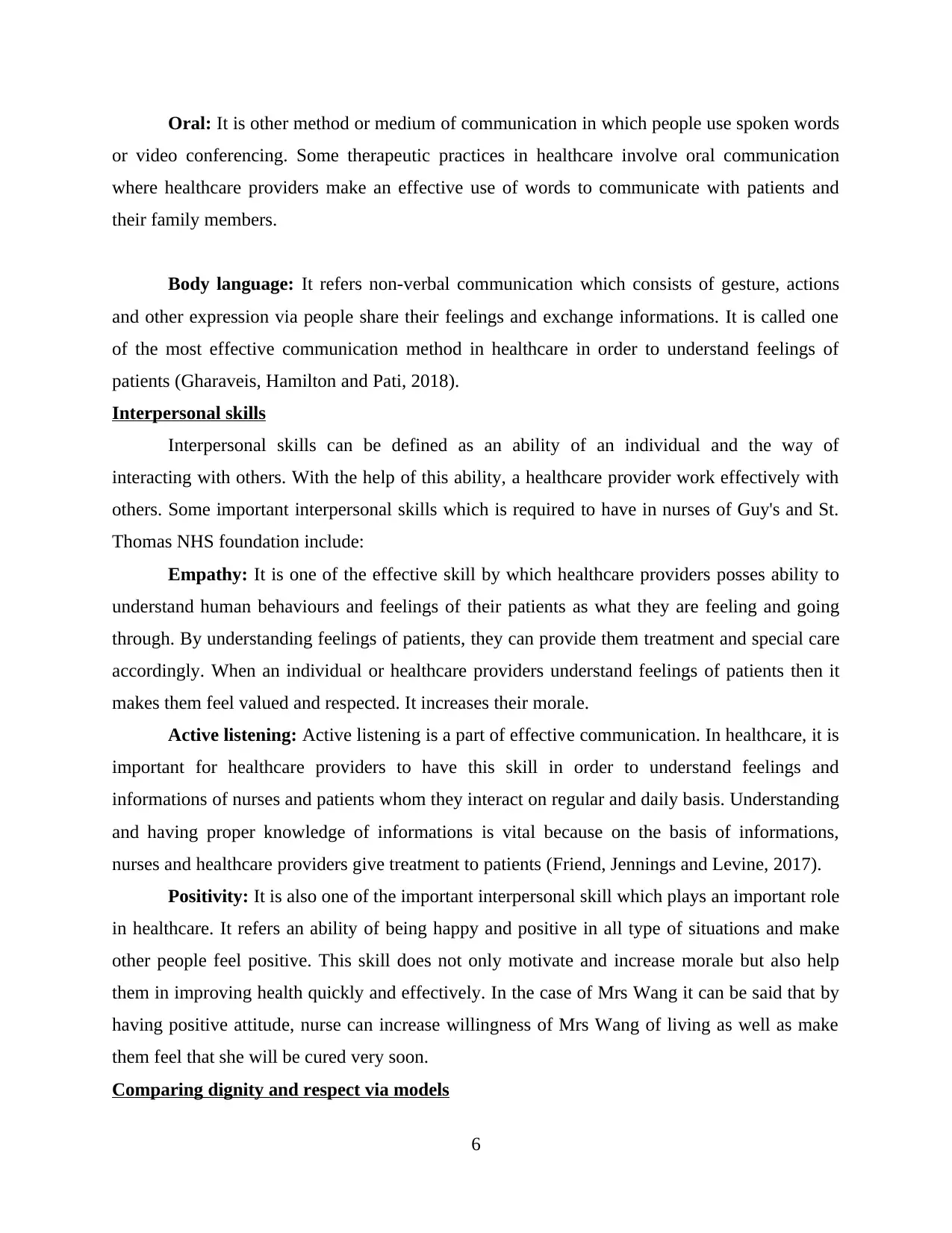
Oral: It is other method or medium of communication in which people use spoken words
or video conferencing. Some therapeutic practices in healthcare involve oral communication
where healthcare providers make an effective use of words to communicate with patients and
their family members.
Body language: It refers non-verbal communication which consists of gesture, actions
and other expression via people share their feelings and exchange informations. It is called one
of the most effective communication method in healthcare in order to understand feelings of
patients (Gharaveis, Hamilton and Pati, 2018).
Interpersonal skills
Interpersonal skills can be defined as an ability of an individual and the way of
interacting with others. With the help of this ability, a healthcare provider work effectively with
others. Some important interpersonal skills which is required to have in nurses of Guy's and St.
Thomas NHS foundation include:
Empathy: It is one of the effective skill by which healthcare providers posses ability to
understand human behaviours and feelings of their patients as what they are feeling and going
through. By understanding feelings of patients, they can provide them treatment and special care
accordingly. When an individual or healthcare providers understand feelings of patients then it
makes them feel valued and respected. It increases their morale.
Active listening: Active listening is a part of effective communication. In healthcare, it is
important for healthcare providers to have this skill in order to understand feelings and
informations of nurses and patients whom they interact on regular and daily basis. Understanding
and having proper knowledge of informations is vital because on the basis of informations,
nurses and healthcare providers give treatment to patients (Friend, Jennings and Levine, 2017).
Positivity: It is also one of the important interpersonal skill which plays an important role
in healthcare. It refers an ability of being happy and positive in all type of situations and make
other people feel positive. This skill does not only motivate and increase morale but also help
them in improving health quickly and effectively. In the case of Mrs Wang it can be said that by
having positive attitude, nurse can increase willingness of Mrs Wang of living as well as make
them feel that she will be cured very soon.
Comparing dignity and respect via models
6
or video conferencing. Some therapeutic practices in healthcare involve oral communication
where healthcare providers make an effective use of words to communicate with patients and
their family members.
Body language: It refers non-verbal communication which consists of gesture, actions
and other expression via people share their feelings and exchange informations. It is called one
of the most effective communication method in healthcare in order to understand feelings of
patients (Gharaveis, Hamilton and Pati, 2018).
Interpersonal skills
Interpersonal skills can be defined as an ability of an individual and the way of
interacting with others. With the help of this ability, a healthcare provider work effectively with
others. Some important interpersonal skills which is required to have in nurses of Guy's and St.
Thomas NHS foundation include:
Empathy: It is one of the effective skill by which healthcare providers posses ability to
understand human behaviours and feelings of their patients as what they are feeling and going
through. By understanding feelings of patients, they can provide them treatment and special care
accordingly. When an individual or healthcare providers understand feelings of patients then it
makes them feel valued and respected. It increases their morale.
Active listening: Active listening is a part of effective communication. In healthcare, it is
important for healthcare providers to have this skill in order to understand feelings and
informations of nurses and patients whom they interact on regular and daily basis. Understanding
and having proper knowledge of informations is vital because on the basis of informations,
nurses and healthcare providers give treatment to patients (Friend, Jennings and Levine, 2017).
Positivity: It is also one of the important interpersonal skill which plays an important role
in healthcare. It refers an ability of being happy and positive in all type of situations and make
other people feel positive. This skill does not only motivate and increase morale but also help
them in improving health quickly and effectively. In the case of Mrs Wang it can be said that by
having positive attitude, nurse can increase willingness of Mrs Wang of living as well as make
them feel that she will be cured very soon.
Comparing dignity and respect via models
6
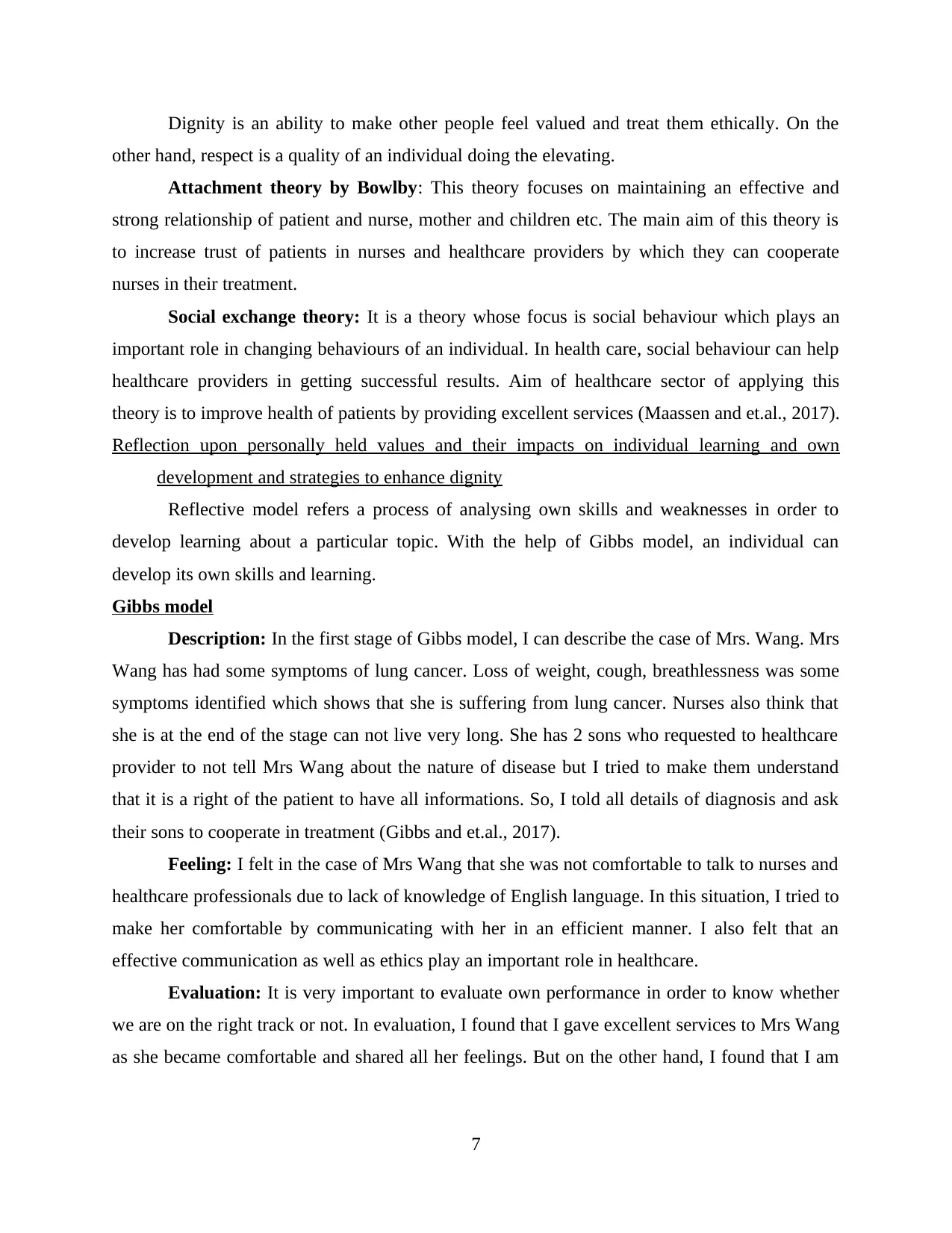
Dignity is an ability to make other people feel valued and treat them ethically. On the
other hand, respect is a quality of an individual doing the elevating.
Attachment theory by Bowlby: This theory focuses on maintaining an effective and
strong relationship of patient and nurse, mother and children etc. The main aim of this theory is
to increase trust of patients in nurses and healthcare providers by which they can cooperate
nurses in their treatment.
Social exchange theory: It is a theory whose focus is social behaviour which plays an
important role in changing behaviours of an individual. In health care, social behaviour can help
healthcare providers in getting successful results. Aim of healthcare sector of applying this
theory is to improve health of patients by providing excellent services (Maassen and et.al., 2017).
Reflection upon personally held values and their impacts on individual learning and own
development and strategies to enhance dignity
Reflective model refers a process of analysing own skills and weaknesses in order to
develop learning about a particular topic. With the help of Gibbs model, an individual can
develop its own skills and learning.
Gibbs model
Description: In the first stage of Gibbs model, I can describe the case of Mrs. Wang. Mrs
Wang has had some symptoms of lung cancer. Loss of weight, cough, breathlessness was some
symptoms identified which shows that she is suffering from lung cancer. Nurses also think that
she is at the end of the stage can not live very long. She has 2 sons who requested to healthcare
provider to not tell Mrs Wang about the nature of disease but I tried to make them understand
that it is a right of the patient to have all informations. So, I told all details of diagnosis and ask
their sons to cooperate in treatment (Gibbs and et.al., 2017).
Feeling: I felt in the case of Mrs Wang that she was not comfortable to talk to nurses and
healthcare professionals due to lack of knowledge of English language. In this situation, I tried to
make her comfortable by communicating with her in an efficient manner. I also felt that an
effective communication as well as ethics play an important role in healthcare.
Evaluation: It is very important to evaluate own performance in order to know whether
we are on the right track or not. In evaluation, I found that I gave excellent services to Mrs Wang
as she became comfortable and shared all her feelings. But on the other hand, I found that I am
7
other hand, respect is a quality of an individual doing the elevating.
Attachment theory by Bowlby: This theory focuses on maintaining an effective and
strong relationship of patient and nurse, mother and children etc. The main aim of this theory is
to increase trust of patients in nurses and healthcare providers by which they can cooperate
nurses in their treatment.
Social exchange theory: It is a theory whose focus is social behaviour which plays an
important role in changing behaviours of an individual. In health care, social behaviour can help
healthcare providers in getting successful results. Aim of healthcare sector of applying this
theory is to improve health of patients by providing excellent services (Maassen and et.al., 2017).
Reflection upon personally held values and their impacts on individual learning and own
development and strategies to enhance dignity
Reflective model refers a process of analysing own skills and weaknesses in order to
develop learning about a particular topic. With the help of Gibbs model, an individual can
develop its own skills and learning.
Gibbs model
Description: In the first stage of Gibbs model, I can describe the case of Mrs. Wang. Mrs
Wang has had some symptoms of lung cancer. Loss of weight, cough, breathlessness was some
symptoms identified which shows that she is suffering from lung cancer. Nurses also think that
she is at the end of the stage can not live very long. She has 2 sons who requested to healthcare
provider to not tell Mrs Wang about the nature of disease but I tried to make them understand
that it is a right of the patient to have all informations. So, I told all details of diagnosis and ask
their sons to cooperate in treatment (Gibbs and et.al., 2017).
Feeling: I felt in the case of Mrs Wang that she was not comfortable to talk to nurses and
healthcare professionals due to lack of knowledge of English language. In this situation, I tried to
make her comfortable by communicating with her in an efficient manner. I also felt that an
effective communication as well as ethics play an important role in healthcare.
Evaluation: It is very important to evaluate own performance in order to know whether
we are on the right track or not. In evaluation, I found that I gave excellent services to Mrs Wang
as she became comfortable and shared all her feelings. But on the other hand, I found that I am
7
Paraphrase This Document
Need a fresh take? Get an instant paraphrase of this document with our AI Paraphraser
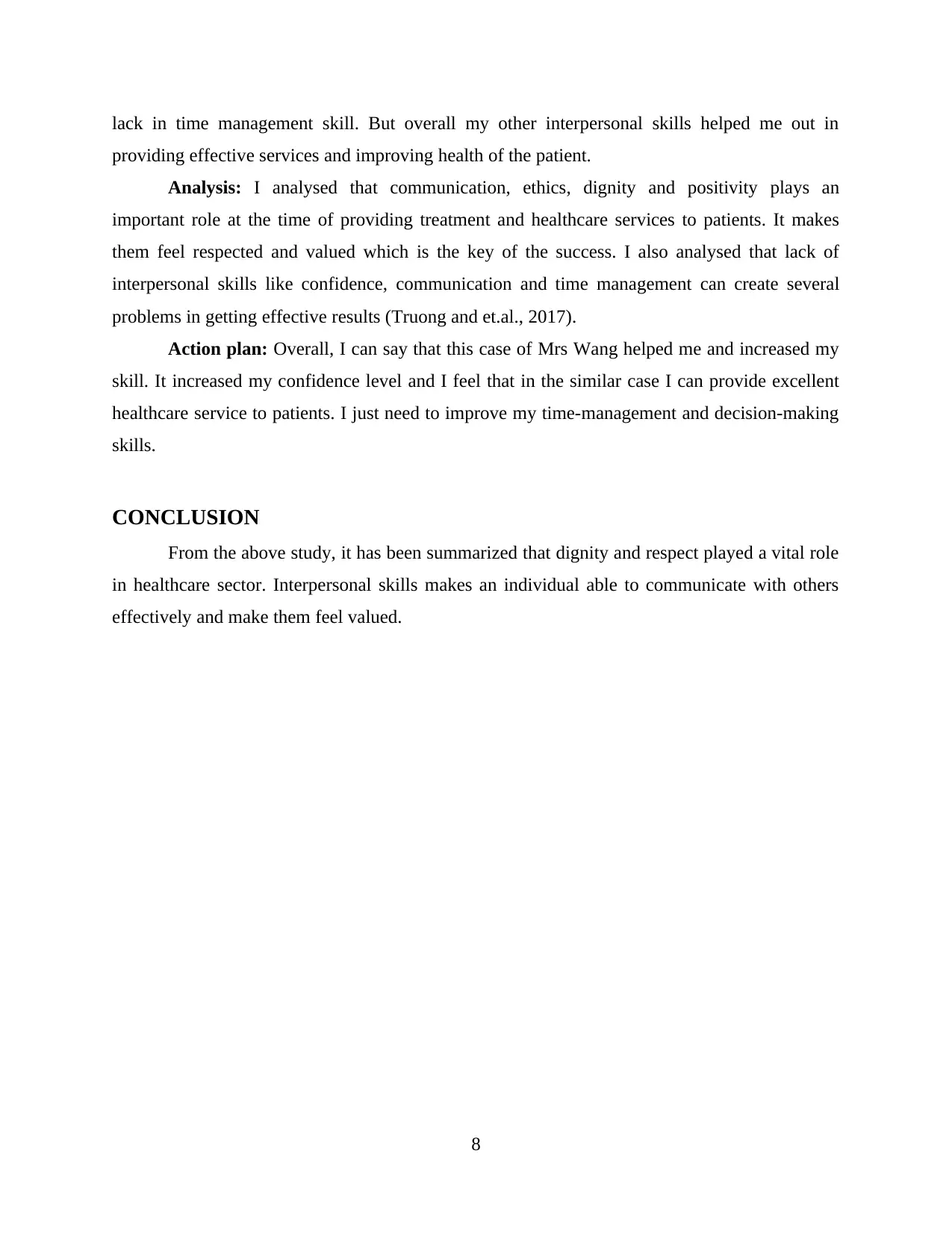
lack in time management skill. But overall my other interpersonal skills helped me out in
providing effective services and improving health of the patient.
Analysis: I analysed that communication, ethics, dignity and positivity plays an
important role at the time of providing treatment and healthcare services to patients. It makes
them feel respected and valued which is the key of the success. I also analysed that lack of
interpersonal skills like confidence, communication and time management can create several
problems in getting effective results (Truong and et.al., 2017).
Action plan: Overall, I can say that this case of Mrs Wang helped me and increased my
skill. It increased my confidence level and I feel that in the similar case I can provide excellent
healthcare service to patients. I just need to improve my time-management and decision-making
skills.
CONCLUSION
From the above study, it has been summarized that dignity and respect played a vital role
in healthcare sector. Interpersonal skills makes an individual able to communicate with others
effectively and make them feel valued.
8
providing effective services and improving health of the patient.
Analysis: I analysed that communication, ethics, dignity and positivity plays an
important role at the time of providing treatment and healthcare services to patients. It makes
them feel respected and valued which is the key of the success. I also analysed that lack of
interpersonal skills like confidence, communication and time management can create several
problems in getting effective results (Truong and et.al., 2017).
Action plan: Overall, I can say that this case of Mrs Wang helped me and increased my
skill. It increased my confidence level and I feel that in the similar case I can provide excellent
healthcare service to patients. I just need to improve my time-management and decision-making
skills.
CONCLUSION
From the above study, it has been summarized that dignity and respect played a vital role
in healthcare sector. Interpersonal skills makes an individual able to communicate with others
effectively and make them feel valued.
8
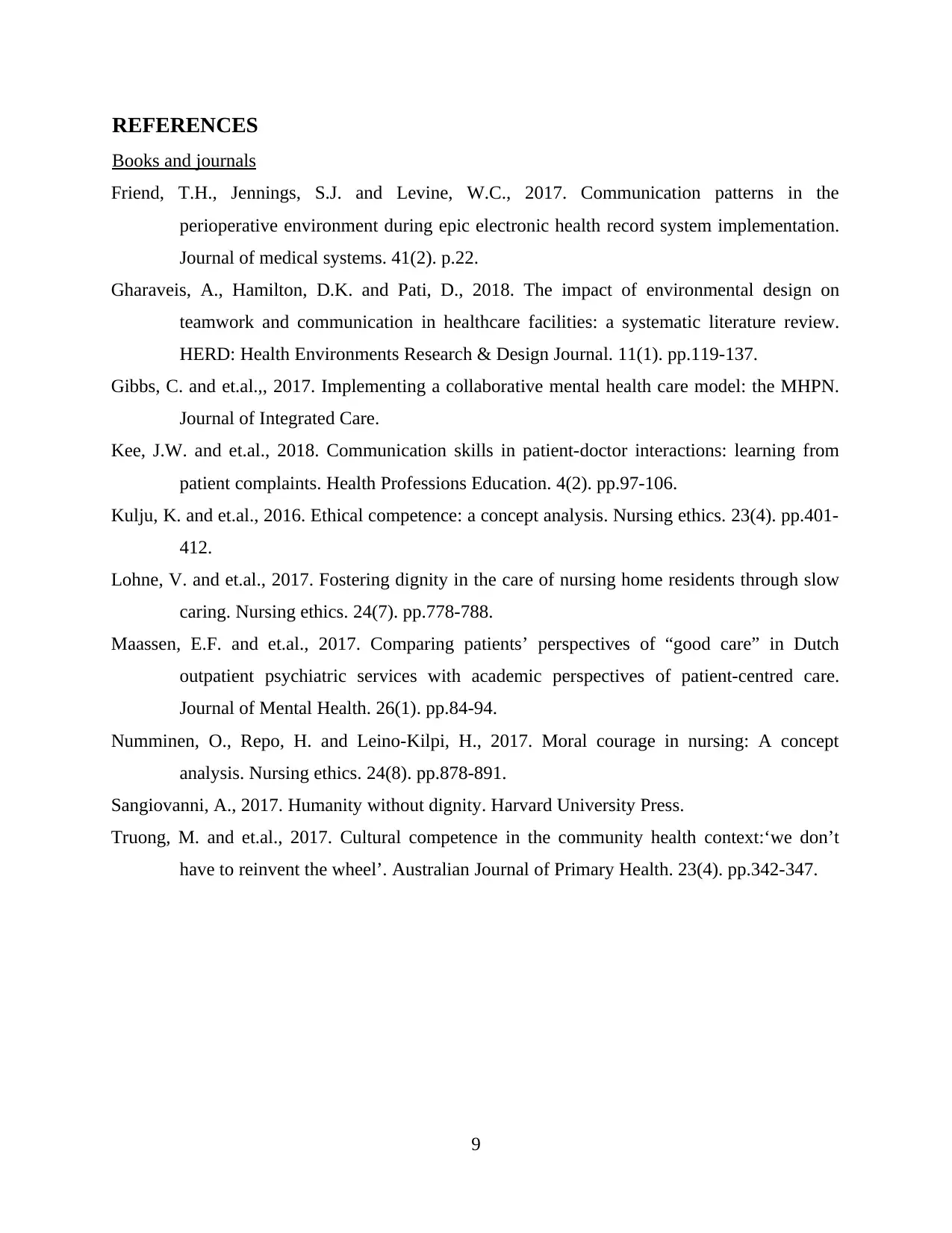
REFERENCES
Books and journals
Friend, T.H., Jennings, S.J. and Levine, W.C., 2017. Communication patterns in the
perioperative environment during epic electronic health record system implementation.
Journal of medical systems. 41(2). p.22.
Gharaveis, A., Hamilton, D.K. and Pati, D., 2018. The impact of environmental design on
teamwork and communication in healthcare facilities: a systematic literature review.
HERD: Health Environments Research & Design Journal. 11(1). pp.119-137.
Gibbs, C. and et.al.,, 2017. Implementing a collaborative mental health care model: the MHPN.
Journal of Integrated Care.
Kee, J.W. and et.al., 2018. Communication skills in patient-doctor interactions: learning from
patient complaints. Health Professions Education. 4(2). pp.97-106.
Kulju, K. and et.al., 2016. Ethical competence: a concept analysis. Nursing ethics. 23(4). pp.401-
412.
Lohne, V. and et.al., 2017. Fostering dignity in the care of nursing home residents through slow
caring. Nursing ethics. 24(7). pp.778-788.
Maassen, E.F. and et.al., 2017. Comparing patients’ perspectives of “good care” in Dutch
outpatient psychiatric services with academic perspectives of patient-centred care.
Journal of Mental Health. 26(1). pp.84-94.
Numminen, O., Repo, H. and Leino-Kilpi, H., 2017. Moral courage in nursing: A concept
analysis. Nursing ethics. 24(8). pp.878-891.
Sangiovanni, A., 2017. Humanity without dignity. Harvard University Press.
Truong, M. and et.al., 2017. Cultural competence in the community health context:‘we don’t
have to reinvent the wheel’. Australian Journal of Primary Health. 23(4). pp.342-347.
9
Books and journals
Friend, T.H., Jennings, S.J. and Levine, W.C., 2017. Communication patterns in the
perioperative environment during epic electronic health record system implementation.
Journal of medical systems. 41(2). p.22.
Gharaveis, A., Hamilton, D.K. and Pati, D., 2018. The impact of environmental design on
teamwork and communication in healthcare facilities: a systematic literature review.
HERD: Health Environments Research & Design Journal. 11(1). pp.119-137.
Gibbs, C. and et.al.,, 2017. Implementing a collaborative mental health care model: the MHPN.
Journal of Integrated Care.
Kee, J.W. and et.al., 2018. Communication skills in patient-doctor interactions: learning from
patient complaints. Health Professions Education. 4(2). pp.97-106.
Kulju, K. and et.al., 2016. Ethical competence: a concept analysis. Nursing ethics. 23(4). pp.401-
412.
Lohne, V. and et.al., 2017. Fostering dignity in the care of nursing home residents through slow
caring. Nursing ethics. 24(7). pp.778-788.
Maassen, E.F. and et.al., 2017. Comparing patients’ perspectives of “good care” in Dutch
outpatient psychiatric services with academic perspectives of patient-centred care.
Journal of Mental Health. 26(1). pp.84-94.
Numminen, O., Repo, H. and Leino-Kilpi, H., 2017. Moral courage in nursing: A concept
analysis. Nursing ethics. 24(8). pp.878-891.
Sangiovanni, A., 2017. Humanity without dignity. Harvard University Press.
Truong, M. and et.al., 2017. Cultural competence in the community health context:‘we don’t
have to reinvent the wheel’. Australian Journal of Primary Health. 23(4). pp.342-347.
9
1 out of 9
Related Documents
Your All-in-One AI-Powered Toolkit for Academic Success.
+13062052269
info@desklib.com
Available 24*7 on WhatsApp / Email
![[object Object]](/_next/static/media/star-bottom.7253800d.svg)
Unlock your academic potential
© 2024 | Zucol Services PVT LTD | All rights reserved.

